NCAA Eligibility Info
We at Pittsburgh Pioneer Elite believe academics are just as important as what you learn on the basketball court. As part of our program, we like to set the right expectation for our team upon graduation. Young athletes who wish to transition into Division I or II athletics in college must meet all standards held by The National Collegiate Athletic Association (NCAA).
NCAA Academic Standards for Initial-Eligibility
The NCAA Eligibility Center verifies the academic and amateur status of all student-athletes who wish to compete in Division I or II athletics.
College-bound student-athletes who want to practice, compete and receive athletically related financial aid during their first year at a Division I or II school need to meet the following requirements:
- Graduate from high school.
- Complete a minimum of 16 core courses for Division I or II.
- Earn a minimum required grade-point average in core courses.
- Earn a qualifying test score on either the ACT or SAT.
- Request final amateurism certification from the NCAA Eligibility Center.
For Division I student-athletes who will enroll in August 1, 2016 and later, the requirements to compete in the first year will change. In addition to the above standards, students must:
- Earn at least a 2.3 grade-point average in core courses.
- Meet an increased sliding-scale standard (for example, an SAT score of 820 requires a 2.5 high school core course GPA)
- Successfully complete 10 of the 16 total required core courses before the start of their seventh semester in high school. Seven of the 10 courses must be successfully completed in English, math and science.
Students that earn at least a 2.0 GPA but not a 2.3 GPA and meet the current sliding scale standard (for example, an SAT score of 1,010 requires a 2.025 high school core course GPA) will be eligible for practice in the first term and athletically related financial aid the entire year, but not competition. Freshmen who are academically successful in the first term will earn the ability to continue to practice for the remainder of the year.
Division III colleges and universities set their own admission standards. The NCAA does not set initial eligibility requirements in Division III.
For more information on eligibility, please visit NCAA.org
Resource Links
- 4 Steps To Contacting College Coaches
- Coach contact (example scenarios and next steps)
- Preparing for coach communication
- Additional tips for effective coach communications
- Which coaches should you contact?
- How to find coach information
- Can high school athletes contact college coaches?
- When can college coaches contact you?
- When should I start contacting college coaches?
- Pay attention to recruiting calendars
- How to let coaches know you’re interested
- How to let coaches know you’re NOT interested
- Should you email or call a college coach to decline an offer?
- How to prepare questions for college coaches
- Common coach questions for recruits
- Parent and coach communication
- How long do college coaches take to respond?
- NCAA eligibility rules and academic requirements
- NCAA amateurism requirements
- Division 1 requirements
- Division 2 requirements
- Division 3 requirements
- Academic status definitions
- NCAA eligibility FAQs
